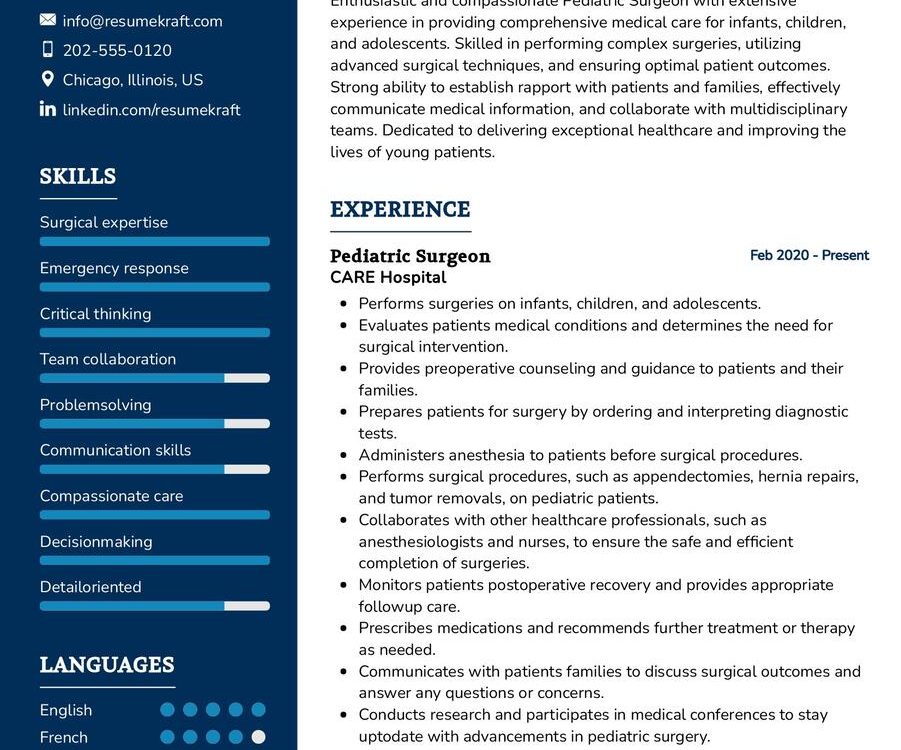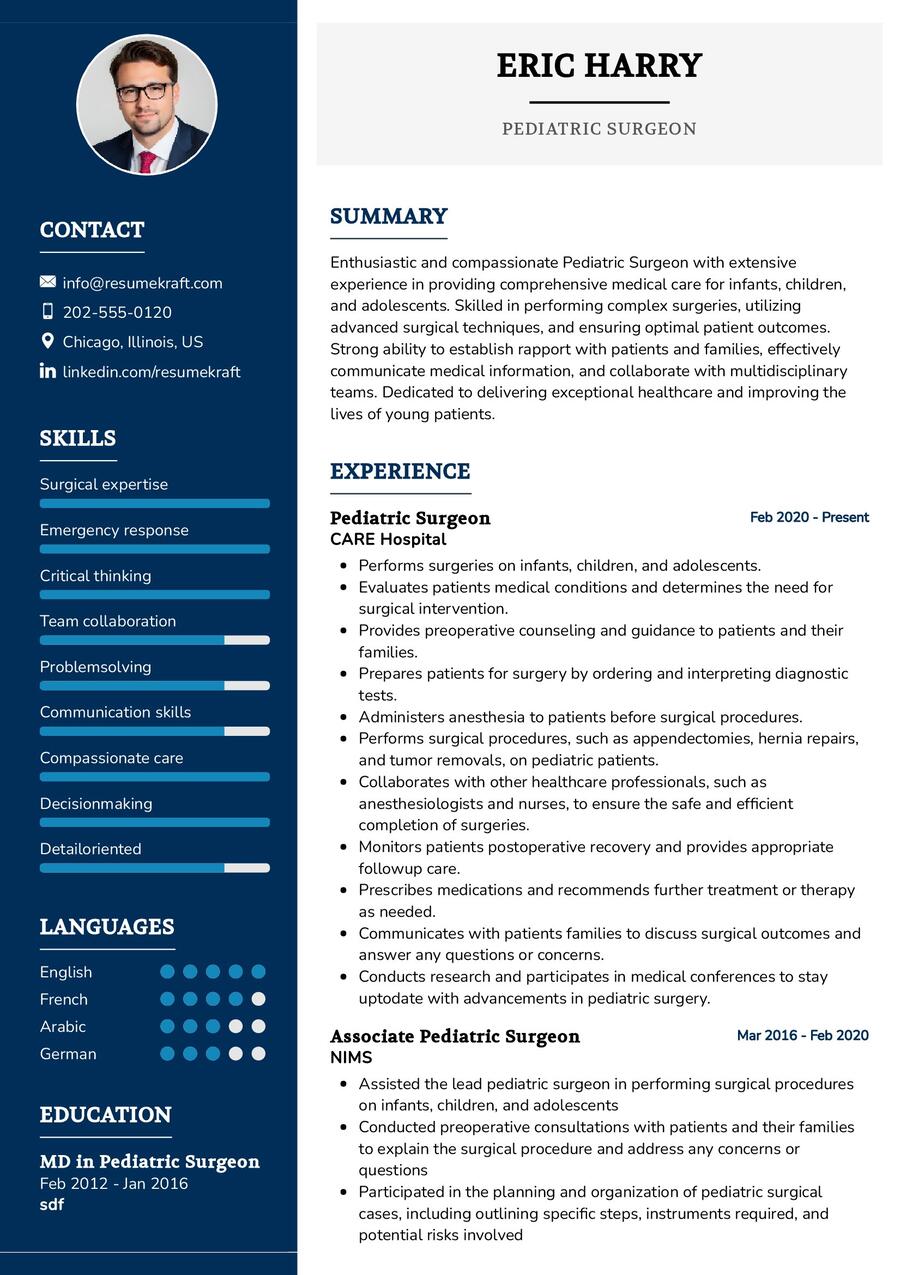The Vital Role of a Pediatric Surgeon
In the ever-evolving field of healthcare, the role of a Pediatric Surgeon stands out as a beacon of hope for children and their families. This unique position requires a delicate balance of medical expertise, compassion, and precision. Let’s delve into the multifaceted role of a Pediatric Surgeon, exploring the nuances of this critical profession that plays a crucial part in the well-being of young patients.
Job Requirements for Pediatric Surgeons
Becoming a Pediatric Surgeon is a journey that demands dedication, years of education, and hands-on experience. Here are the prerequisites one needs to fulfill to embrace the role of a Pediatric Surgeon:
- A Medical Doctor (MD) or Doctor of Osteopathic Medicine (DO) degree, showcasing a solid foundation in the medical field.
- Completion of a residency program in general surgery, followed by a fellowship in pediatric surgery, demonstrating specialized training.
- Board certification in pediatric surgery, a testament to meeting high standards of knowledge and expertise.
- Exceptional surgical skills, honed through years of experience and specialization in pediatric cases.
- Effective communication skills, crucial for interacting with young patients and their families.
- Compassion and empathy, essential qualities in providing care to children facing surgical procedures.
- Adaptability and the ability to work under pressure, traits vital in the fast-paced world of pediatric surgery.
Continued education and staying updated on the latest advancements in pediatric surgery are integral to excelling in this demanding field.
Responsibilities of a Pediatric Surgeon
The role of a Pediatric Surgeon encompasses a spectrum of responsibilities, each contributing to the well-being of young patients. Let’s explore the key responsibilities that define this specialized profession:
- Performing surgical procedures on infants, children, and adolescents, addressing congenital anomalies, injuries, and other medical conditions.
- Collaborating with a multidisciplinary healthcare team, including pediatricians, nurses, and anesthesiologists, to ensure comprehensive patient care.
- Diagnosing and treating surgical conditions in newborns and children, often requiring a high level of precision and expertise.
- Providing pre-operative and post-operative care, offering support to both the young patients and their families throughout the surgical journey.
- Participating in medical research and staying informed about advancements in pediatric surgical techniques and technologies.
- Educating medical students, residents, and other healthcare professionals about pediatric surgical practices.
- Ensuring compliance with healthcare regulations and ethical standards, prioritizing patient safety and well-being.
Each responsibility undertaken by a Pediatric Surgeon contributes to the overarching goal of enhancing the health and future of their young patients.
Crafting an Outstanding Pediatric Surgeon Resume
Your resume is a gateway to opportunities in the field of pediatric surgery. Here are some tips to create a compelling resume that reflects your expertise and dedication:
- Highlight your surgical experience, showcasing the range of procedures you’ve successfully performed on pediatric patients.
- Detail your collaboration with healthcare teams, emphasizing the importance of teamwork in providing comprehensive care.
- Include patient success stories or impactful cases, demonstrating the positive outcomes of your surgical interventions.
- List any research contributions or publications, showcasing your commitment to advancing the field of pediatric surgery.
- Emphasize your commitment to continuous learning, including any additional certifications or training programs you have completed.
Your resume is not just a document; it is a testament to your skills, experience, and dedication to the well-being of children.
Pediatric Surgeon Resume Summary Examples
Your resume summary is a snapshot of your career, encapsulating your experiences and the value you bring to pediatric surgery. Here are some examples to inspire you:
- “Dedicated Pediatric Surgeon with a decade of experience, specializing in complex pediatric cases and fostering a compassionate approach to patient care.”
- “Board-certified Pediatric Surgeon known for successful interventions in congenital anomalies, committed to advancing pediatric surgical practices through research and education.”
- “Experienced Pediatric Surgeon with a track record of providing exceptional surgical care to children, combining technical expertise with a patient-centered approach.”
Your resume summary sets the stage for your unique journey in pediatric surgery, showcasing your expertise and commitment to the well-being of young patients.
Building Your Pediatric Surgeon Experience Section
Your experience section is the heart of your resume, where you narrate your journey in pediatric surgery. Here are examples to guide you:
- “Led a pediatric surgery team in a renowned children’s hospital, achieving a 95% success rate in complex congenital heart defect surgeries.”
- “Pioneered minimally invasive pediatric surgical techniques, reducing recovery times and improving overall patient outcomes.”
- “Collaborated on research projects exploring innovative approaches to pediatric surgical interventions, contributing to advancements in the field.”
Your experiences shape your identity as a Pediatric Surgeon, showcasing your impact and contributions to the field.
Education Section for Your Pediatric Surgeon Resume
Your educational journey forms the foundation of your career as a Pediatric Surgeon. Here’s how you can list your educational milestones:
- Doctor of Medicine (MD), Pediatric Surgery Specialty, XYZ Medical School, a comprehensive program preparing you for specialized pediatric care, 2012.
- Residency in General Surgery, ABC Hospital, gaining a solid foundation in surgical practices, 2016.
- Fellowship in Pediatric Surgery, DEF Children’s Hospital, specializing in surgical interventions for pediatric patients, 2018.
Each educational milestone contributes to your expertise, showcasing your dedication to becoming a skilled Pediatric Surgeon.
Skills Essential for a Pediatric Surgeon Resume
Your skill set is a toolbox, equipped with abilities crucial for success in pediatric surgery. Let’s list down the essential skills for a Pediatric Surgeon:
Soft Skills:
- Compassion and empathy, essential for connecting with young patients and their families.
- Effective communication, ensuring clear and empathetic interactions with patients, families, and healthcare teams.
- Teamwork and collaboration, vital for a multidisciplinary approach to patient care.
- Adaptability and resilience, crucial in the ever-evolving field of pediatric surgery.
- Attention to detail, ensuring precision in surgical procedures and post-operative care.
Hard Skills:
- Exceptional surgical skills, honed through specialized training in pediatric surgery.
- Knowledge of pediatric anatomy and physiology, critical for accurate diagnoses and effective surgical interventions.
- Proficiency in surgical technologies, staying updated on advancements in pediatric surgical equipment and techniques.
- Research and academic skills, contributing to the advancement of pediatric surgical practices.
- Board certification in pediatric surgery, showcasing high standards of knowledge and expertise.
Each skill in your toolbox contributes to your ability to provide exceptional care to young patients as a Pediatric Surgeon.
Common Mistakes to Avoid in Your Pediatric Surgeon Resume
As you craft your resume, be mindful of common pitfalls that can impact your chances. Here are some mistakes to avoid:
- Using generic language, failing to highlight your unique contributions and impact in pediatric surgery.
- Neglecting to quantify your achievements, missing an opportunity to showcase the tangible results of your surgical interventions.
- Overlooking the importance of a cover letter, a valuable tool to express your passion for pediatric surgery and connect with potential employers.
- Including too much technical jargon, potentially alienating those not familiar with the specifics of pediatric surgery.
- Skipping the proofreading step, which can impact your professional image and attention to detail.
Avoid these common mistakes to ensure your Pediatric Surgeon resume is impactful and compelling.
Key Takeaways for Your Pediatric Surgeon Resume
As we conclude this comprehensive guide, remember these key points when crafting your Pediatric Surgeon resume:
- Highlight your surgical expertise and success in pediatric cases, showcasing the positive impact on young patients.
- Emphasize collaboration and teamwork, underlining the importance of a multidisciplinary approach in pediatric surgery.
- Showcase your commitment to continuous learning, including certifications, training, and contributions to research in pediatric surgery.
- Express your passion for pediatric surgery through personalized anecdotes or stories that reflect your dedication.
Finally, feel free to utilize resources like AI Resume Builder, Resume Design, Resume Samples, Resume Examples, Resume Skills, Resume Help, Resume Synonyms, and Job Responsibilities to create a standout application and prepare for the Pediatric Surgeon job interview.
Armed with these insights and tips, you are now ready to craft a resume that not only showcases your skills and experience but also conveys your passion for providing exceptional pediatric surgical care. Best of luck!


